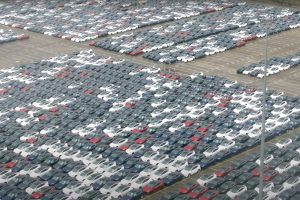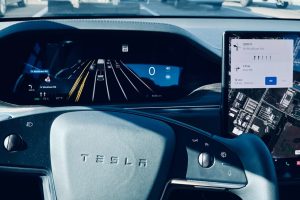Key Takeaways
- Tesla benefits from Trump’s tariffs as its U.S.-based production shelters it from the direct impacts felt by other automakers.
- Tesla’s production for the U.S. market occurs entirely in California and Texas, avoiding the newly imposed tariffs on foreign vehicles.
- Tesla’s stocks rose following the tariff announcement, highlighting its advantageous market position.
- Analyst Itay Michaeli views Tesla as a victor in the tariff situation due to its domestic production and market strategy.
- Despite local production, Tesla faces challenges from increased costs due to foreign-sourced parts that aren’t easily replaced by U.S.-made alternatives.
- Rivian and Lucid, like Tesla, produce all their U.S. vehicles domestically, whereas companies like Ford and GM have significant foreign production footprints.
- Elon Musk expressed concern on social media about rising costs from foreign parts, indicating the tariffs’ broader implications on the supply chain.
The recent announcement of new U.S. tariffs on foreign automobiles has sent shockwaves through the automotive industry, causing many automaker stocks to tumble. However, one company has managed to navigate these turbulent waters to its advantage: Tesla. With a well-thought-out domestic production strategy, Tesla stands out as a relative beneficiary of the U.S. government’s tariff decision. In this comprehensive blog post, we delve into the factors that shelter Tesla from the harshest impacts of these tariffs, explore the challenges that still loom, and examine the broader implications for the U.S. auto industry.
Tesla’s Strategic Edge
100% U.S.-Based Production
Tesla’s preparation and strategic focus on domestic production have placed it in a unique position amid the new tariffs announced by the U.S. government. Unlike its competitors, Tesla manufactures all vehicles sold in the United States within its own borders, specifically at its Fremont, California, and Giga Austin, Texas, facilities. This 100% U.S. production footprint effectively shields Tesla from the 25% tariff on foreign-made vehicles set to go into effect on April 2, 2025.
Market Reaction
This strategic advantage didn’t go unnoticed by investors. Following the tariff announcement, Tesla’s stock experienced an uptick, underscoring the confidence that market participants have in the company’s ability to capitalize on its domestic production setup. As other automakers grapple with potential impacts to their profit margins, Tesla’s position looks comparatively strong.
An Analyst’s Perspective
Industry analyst Itay Michaeli from TD Cowen has highlighted Tesla as a winner in the current trade environment. Michaeli argues that Tesla’s domestic focus positions it advantageously, especially in the midsize crossover segment. With nearly half of this market susceptible to tariffs, Tesla’s Model Y, assembled domestically, emerges as a competitive option for American consumers.
The Challenges Ahead
Supply Chain Vulnerabilities
Despite its favorable position relative to the tariffs, Tesla is not without challenges. CEO Elon Musk has noted that the company’s reliance on certain foreign-sourced parts could drive up production costs. In a letter to the U.S. Trade Representative, Tesla highlighted the difficulty in sourcing some components domestically, even with aggressive localization efforts.
- Foreign Sourced Parts: Foreign-sourced parts are integral to Tesla’s operations, and replacing them with U.S. equivalents is not always feasible.
- Cost Increases: The tariffs could realistically lead to increased production costs for Tesla, affecting pricing and profitability if U.S. sourcing solutions are not viable.
Wider Industry Impact
Tesla is not the only company producing vehicles domestically. Rivian and Lucid also manufacture all their U.S. vehicles locally, offering them some relief from the tariff impacts. However, traditional automakers like Ford, which produces 77% of its vehicles domestically, Stellantis at 57%, and Nissan and GM each at 52%, may feel more pressure. These companies must reconsider their production strategies to mitigate tariff-related risks.
Tesla’s strategic foresight in focusing on U.S. production has provided it with a significant buffer against recent tariff increases, highlighting the importance of domestic manufacturing in today’s volatile trade environment. Nonetheless, challenges related to supply chain constraints underscore that tariff policies can have complex and far-reaching effects.
As the situation evolves, Tesla’s strategy—as well as that of its competitors—will likely continue to impact market dynamics and consumer choices in significant ways.





